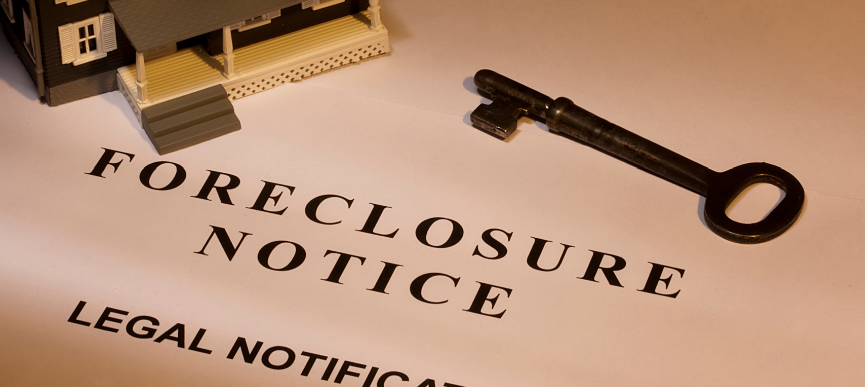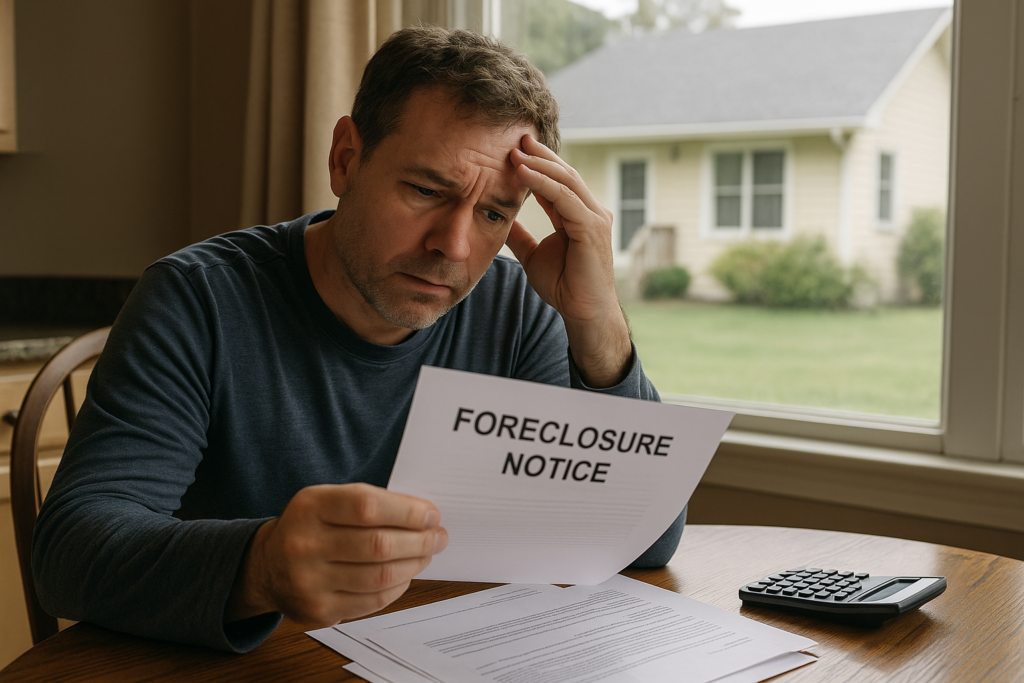*updated 6-25-25
If anxiety skyrockets when you receive a foreclosure notice of default letter, that is okay and you’re not alone.
According to the Mortgage Bankers Association, approximately 250,000 homeowners are foreclosed upon each year.
Not all notices of default end in actual foreclosure of your Texas home.

What Is Foreclosure Notice Of Default In Texas?
Many foreclosure proceedings in Texas get resolved or halted due to a variety of reasons. Here are some tips to avoid foreclosure in DFW:
- Don’t Ignore the Problem. Ignoring the notice of default will only make matters worse. It’s a crucial time to engage with your mortgage servicer about missed monthly payments, not retreat in fear. The more you ignore the problem, the fewer available options you’ll have.
- Review Your Finances. Now is the time to get a clear understanding of your financial situation. Be honest with yourself and recognize what you can and cannot afford. Prioritize your spending to include home loan payments, if possible.
- Legal Assistance. As our team who has navigated the choppy waters of foreclosure, we cannot overstate the importance of professional legal advice. In our real estate journeys, working with a real estate attorney who specializes in Texas foreclosure laws is a game-changer to get additional time to work though the foreclosure process. They can help explore options like loan modification, understand your right of redemption, and guide you through the legal maze outlined in the Texas Property Code and federal law.
- Mortgage Modification. Modifying your loan agreement could be a ray of hope. Even if you’ve accumulated days delinquent or face a late fee, lenders may still work with you.
- Sell Your House Quickly. If keeping up with your mortgage is no longer possible, a fast sale of your real property may prevent a foreclosure action or a damaging deficiency judgment.
Foreclosure Notice of Default Explained
From our “boots on the ground” experience, we know how difficult it is when you receive that first notice of acceleration and foreclosure letter.
Let us assure you—it’s not the end of the road. You have options, even in a non-judicial foreclosure state like Texas.
Arm yourself with knowledge, understand your rights, and explore every option. It can make all the difference.
If you need additional information, please reach out to our trained team at Bright Bid Homes. We have tools and solutions to help property owners just like you.
Foreclosure is a process governed by both Texas law and federal rules, including guidance from the Consumer Financial Protection Bureau.
Take it one step at a time—you’re not alone.
Non-Judicial Foreclosure Process
A foreclosure notice of default is a document that must be filed by the lender to initiate the nonjudicial foreclosure process.
The notice of default is sent via certified mail to all parties with a security interest in the sale of the property, including contractors and junior lien holders. It is also filed with the County Clerk’s Office and becomes part of the public records.
The notice must be posted visibly on the property and published in the newspaper, per requirements across Texas counties. These steps are key to consumer protection and are upheld by the Texas Constitution.
Texas Foreclosure Laws: Notice Of Sale
Mistakes can happen—even in the foreclosure sale notice process.
Some homeowners have lost their homes to the highest bidder without proper court order or legal process.
We’ve seen these cases happen right here in DFW.
The notice of default signals a potential substitute Trustee’s sale, often scheduled for the first Tuesday of every month at the county courthouse and enforced by the county sheriff.

Avoiding Foreclosure: Steps You Should Take
- Take a deep breath and stay calm. These situations don’t happen overnight. Whether you’re facing a property tax lien or have fallen behind on your mortgage, remaining calm will help you make smart decisions to stop a foreclosure crisis.
- Research and educate yourself. Understand how a power of sale clause in your deed of trust impacts your foreclosure timeline. Unlike a judicial foreclosure state, Texas lenders don’t need to go through county court unless certain exceptions apply.
- Gather your resources and paperwork. Organize your loan documents, promissory note, and any demand letter or written notice you’ve received. Verify details through the County Clerk’s personnel or visit your local Commissioners Court if needed.
- Know and review your options. Depending on your case, Chapter 7 Bankruptcy or a cash sale may help you avoid foreclosure. Some homeowners qualify for protection under the Home Equity Loan Foreclosures provision.
- Reach out and communicate. The goal is to stop the foreclosure process. Lenders and servicers act on the behalf of the lender and are open to dispute resolution. If you’re on active duty, additional protections apply under federal law.
Financial & Legal Considerations
Failing to act quickly can result in permanent loss of your home and even a lawsuit or cause of action. You may also forfeit rights under your redemption period.
We encourage you to consult the Texas State Law Library, get proper legal advice, and understand your rights under real estate law.
Missed steps, unfiled legal notices, or ignored time limits can harm your case. If you’re unsure, consult a qualified attorney or housing counselor.
If this situation sounds familiar and you need help, reach out. Our team at Bright Bid Homes has helped many Texans through tough times. We’re here to help you, too.
Call us at (214) 833-6269 or contact us today. Let’s talk through your options.

*Blog originally posted 9-8-2023
** Disclaimer: Bright Bid Homes provides this content as a public resource to help Texas homeowners understand the foreclosure process and their potential rights. It should not be considered legal advice. Situations involving a Notice of Default, Notice of Substitute Trustee Sale, or public auction are time-sensitive. Deadlines like the first Tuesday of the month sale date are legally binding and enforced through county courts and occasionally the Court of Appeals.
Matters involving borrower defaults, loan servicing, or the transfer of possession of the property can carry lasting consequences. If you have questions about mortgage payments, the validity of foreclosure documents, or whether a short sale or reinstatement is a good idea, you should seek guidance from a licensed attorney who understands Texas foreclosure law and recent developments in real estate law.
Bright Bid Homes does not offer legal representation but can help connect you to trusted professionals or provide general guidance about selling your home before foreclosure. Please request specific information or ask for copies of individual notices through your lender, county records office like this notice in Collin county and Plano TX, or legal counsel.
